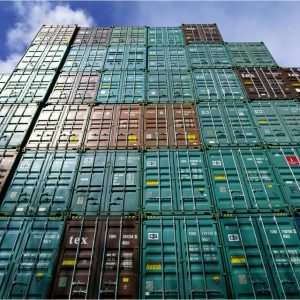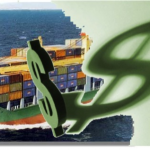No-Roll Premiums Are Like Holding Cargo for Ransom
 No-roll premiums? What’s that?
No-roll premiums? What’s that?
Hopefully, as a shipper, you’ve never heard of a no-roll premium. Unfortunately, many shippers are finding out about them right now as they’re being forced to pay them. Maybe forced is too strong of a word. Let’s go with coerced.
I usually try to be fairly neutral in these blog posts about international shipping news, but on this topic I can’t be. This is disgusting. Importers and exporters shipping cargo from Europe to the Far East, the Far East to Europe, and from Asia to the U.S. are being hit with charges from carriers they should never see: no-roll premiums.
What Are No-Roll Premiums
If you’re an international shipper, you probably know all about general rate increases (GRIs) and peak season surcharges (PSSs) from ocean freight carriers. However, there’s a good chance you’re less familiar with no-roll premiums. That one doesn’t even have an acronym international shipping professionals would likely recognize. I guess I could make call the charge an NRP, but I wouldn’t give it the satisfaction.
A no-roll premium is when carriers charge shippers money – extra money – to ensure their cargo doesn’t face rollover onto a later sailing. It’s basically a rate increase through threat of delaying your shipment.
You know what they call holding on to something that belongs to someone else unless they pay you more money than you’re owed? Apparently, they call that a no-roll premium. I call it ransom.
Shippers Paying $400-$500 No-Roll Premiums
Sam Whelan reported in an article published by the Loadstar:
Shipping lines are using rollovers to bump up freight rates, ‘forcing’ the vast majority of shippers to pay no-roll premiums.
According to Cas Pouderoyen, head of ocean freight at Agility, around 80% of shippers feel they have to pay premiums of $400 to $500 per container on the deepsea trades.
“Otherwise, odds are, you’re going to be rolled,” he said.
“That’s happening with cargo going Europe-to-Far East, Far East-to-Europe and transpacific-eastbound. The latter is the worst, in terms of guaranteed space.”
How Are Carriers Getting Away With No-Roll Premiums?
After years of struggling with lower than healthy freight rates, it seems ocean carriers have found the Viagra to keep freight rates up. That Viagra isn’t a little pill to create blood flow but blank sailing to create capacity control on shipping routes.
This is a subject that has shown up a great deal in Universal Cargo’s blog over the course of this year. Carriers have blank – ocean shipping’s fancy way of saying cancelled – hundreds of sailings in 2020, reducing capacity so much that freight rates have soared at a time when factors like reduced demand and plummeting oil prices should have put downward pressure on rates.
Of course, shippers never like blank sailings, especially when their cargo was supposed to be on a voyage that was blanked. The term blank sailing for shippers is almost synonymous with delays. And delays in receiving imports or exporting goods to customers overseas can often be quite costly for shippers. Many shippers have extra reason to hate that happening right now.
Wouldn’t you know, carriers finally figured out how to control capacity effectively to increase rates the same year a pandemic hits and causes many shippers to be in a more difficult financial place than perhaps they’ve ever been. Blank sailing after blank sailing has meant a decrease in service paired with an increase in cost.
Carriers have been able to effectively implement GRIs and even start pushing PSSs before reaching what is traditionally considered the peak season. Shippers have had no choice but to pay higher freight rates, even at amounts that are 100+% more expensive than they were the same time the year before. While paying more, shippers suffered delays from blanked sailing. Sometimes shippers saw cargo that was already delayed because its original sailing was blanked get rolled over again and possibly again because there was not enough space left on the next ships from all the other rolled over cargo being added or that next ship also being blanked.
In the middle of all this blank sailing and rollovers, carriers came up with the brilliant idea to charge a no-roll premium shippers could buy to make sure their cargo is priority to get on the next ship sailing out. If shippers choose not to pay this extra amount, that’s fine, but their cargo will probably experience rollover to make sure the shippers who paid no-roll premiums have the better service.
It should be noted that no-roll premiums do not create better service. These extra costs merely buy shippers the service they were supposed to get in the first place while creating incentive for carriers to provide worse service to shippers unwilling or unable to pay the extra $400-$500 per container.
Carriers Losing Benefit of Doubt
Last week, we blogged about how carriers are being accused of profiteering off of the global crisis happening with the coronavirus pandemic. The maritime research company Drewery concluded in response to these accusations that “capacity over-reductions [from carriers this year] look more like understandable misjudgements rather than anything more malicious” and is “inclined to give carriers the benefit of the doubt, for now.”
I wasn’t willing to go so far as to say carriers were profiteering, though I was already able to understand why shippers thought they were. Utilizing their alliances to shrink capacity extraordinarily, producing higher freight rates and profit at a time when losses seemed inevitable is enough to raise eyebrows. Still, capacity is something carriers control and demand is difficult to predict. It is not unreasonable to give the benefit of the doubt there. However, I find it much more difficult to extend the benefit of doubt when carriers implement no-roll premiums after putting their customers through rollover after rollover in the middle of an extremely economically challenging time. Correction: an extremely challenging economic time for many around the globe but not for carriers.




